Tribeca Review & Interviews: BETHANY HAMILTON: UNSTOPPABLE: Strength & Endurance Personified
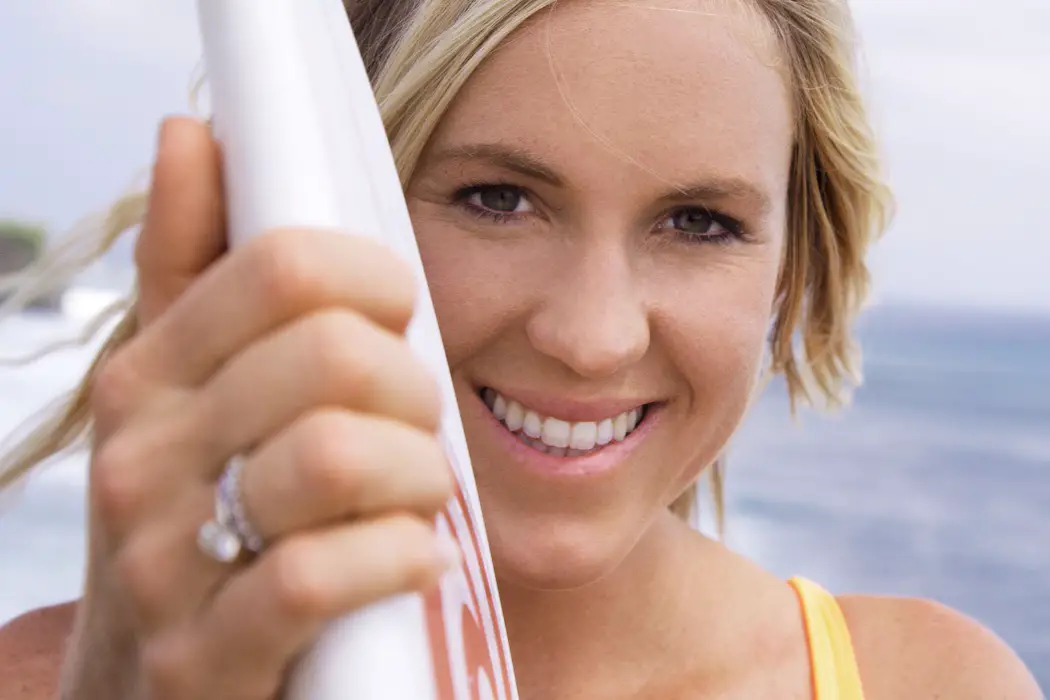
Kristy Strouse is the Owner/Editor in Chief of Film Inquiry,…
You’ve probably heard of Bethany Hamilton. Maybe you saw the film about her from 2011 called Soul Surfer, or perhaps you’ve just heard about her remarkable story: when she was 13 she was attacked by a tiger shark, losing one of her arms, but it didn’t deter her from following her dream of surfing.
The Conquering Athlete
She’s tremendously talented, and the new documentary pays due to her extraordinary history, but it also strikes a wonderful balance between her athleticism and her family life, including her marriage and becoming a mother. It’s a personal story, one that focuses on the woman, and not just her notoriety as a shark attack survivor.
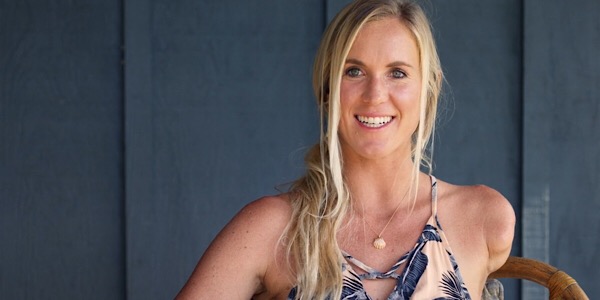
Director Aaron Lieber, a veteran in the surf-film world, knows how to capture the ocean in all of its rapturous glory, and there are some shots that are absolutely breath-taking to behold. Throughout the film, these are sprinkled in exhibiting Hamilton’s continual love for the sea and of her commandment on a board. Much like the ocean she loves, she is a force.
There’s also an intimate touch. In our interview, Lieber says he became friends with Bethany and her brother Noah, and that’s obvious. There’s a comfort to this documentary, even in the most harrowing of moments. As a viewer, you become emotionally invested in her story, in part because it’s an expertly crafted documentary. With an arrangement of footage, mixed from both archival and the years that Lieber followed her, this takes us from her childhood through the attack, to her preparation for competitions on the pro-circuit.
It’s nearly impossible not to be moved by her tale. She’s a fighter- yes, but she’s also a very down to earth and likable woman. This film highlights someone who isn’t asking for it, but should be rooted for all the same. As you watch the documentary you get a sense of how hard she works, and the amount of effort and bravery her passion requires. Yes, she’s had impediments, but that hasn’t stopped her yet.
Bethany Hamilton: Unstoppable: Conclusion
Bethany Hamilton: Unstoppable is an aptly named, inspirational documentary. Perseverance and courage are powerful themes, and this delivers them in a relatable, spirited package, imbued with the passion of a woman who never lets her misfortunes define her. Instead, she’s flourished. Look out: she’s just begun.
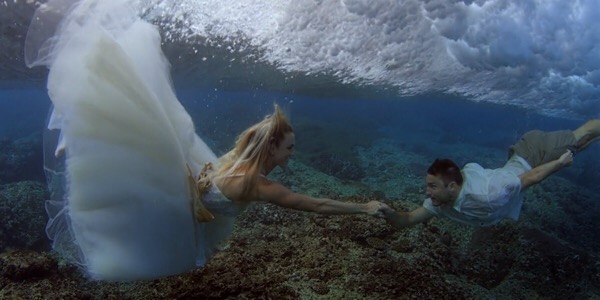
During the Tribeca Film Festival, I was able to sit down with the team behind the project: director Aaron Lieber and producers Penny Edmiston and Jane Kelly Kosek, to have a conversation about the making of this powerful documentary.
Kristy Strouse for Film Inquiry: It’s great to meet and talk to you all! I really enjoyed the film. [To the producing team] can you tell us how involved you were in the process?
Jane Kelly Kosek: Well we had come on board when Aaron had shot probably 90% of the movie. And he said, “I have all this footage, and I really need producers to come on board and help us get through post production and help us sell the movie.” He’s such an accomplished director and EP/producer that he was able to do all of that, pretty much on his own. And then we came on board to really discuss strategy. How do we release this, and what’s the best way to do it? Creatively even, how do we shape the movie in a way that’s really going to tell the story of Bethany and have it not just be a surf movie. We wanted to really talk about who she is and where she’s going from here.
Aaron Lieber: From my perspective too, I would have loved to have had them [Jane and Penny] for all four years of my production. I didn’t have a huge budget, and I couldn’t afford it at the time, but as the film grew I realized I really needed help. I wanted female producers who had a background in narrative, but also had a clear understanding of how to unroll and launch it, but also make sure that the female narrative was true. Obviously, Bethany is a part of that, but just having multiple different women involved, I think, was really important. And they’re being humble [gestures to Penny and Jane] there is so much that they did behind the scenes. So many emails and just babysitting me, [laughs] that it really made all the difference in the world.
Since there was so much of the film already shot, what was it that you saw that intrigued you, and made you want to get involved?
Jane Kelly Kosek: Ohh I was on board as soon as I heard it was a documentary on Bethany Hamilton! [laughs]
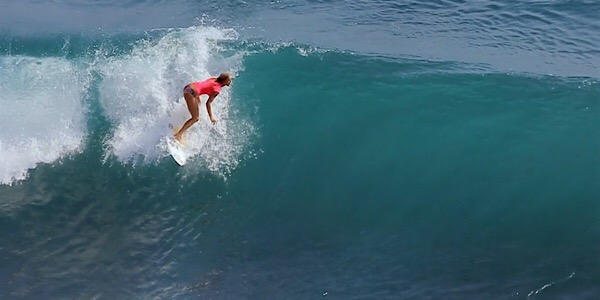
Penny Edmiston: It was kind of fun because I had met with Aaron and then I called Jane, and I had this whole speech that I was going to say on the phone and I just said “Bethany Hamilton” and she instantly said yes. I started to say “Okay, well can I…” and she stopped me and said “Yes! Yes!” Still to this day I haven’t been able to say it all. [laughs]
So safe to say, you were a fan of Bethany Hamilton?
Jane Kelly Kosek: Oh absolutely. I had known about her story and I always thought about how courageous it was to be able to go back into the water after that had happened, and I wanted to find out how she was able to do that. So, I was intrigued, and that’s often how we want to make our movies. Because we are compelled to tell stories that really interest us.
Penny Edmiston: And it was also Aaron’s angle of the story. She had been labeled as a shark survivor and it was about getting past that stigma to what an amazing athlete she is. That was very attractive, because obviously you have to touch on that, but she’s so much more than that. I knew very little about surfing, so I felt the same as Jane, that we could help make sure that anyone could come see this movie. Even someone who has no idea about surfing.
It’s an inspirational story about female empowerment, and about how you can be a mom and an athlete at the same time. It’s way more than just a surf film, and you can come and actually understand the different types of surfing and why she is so talented.
Jane Kelly Kosek: Yes, and I just want to add that once we saw Aaron’s footage we were blown away.
Yes, there are some really beautiful shots throughout the film. It’s truly breathtaking.
Jane and Penny: Exactly!
Aaron Lieber: Thank you! Just to add to your earlier question too- there’s a structure of building a film like this, that I wasn’t necessarily aware of, because I didn’t go to film school, and so we did a screening to get feedback and I would have never known to do that. I mean, I know people do it, but I wouldn’t have without these two. They really pushed for that, and that made a huge difference.
The screening we did was of a two-hour film, and we just didn’t know what to get rid of. There was 30 minutes we had to kill. They pushed us and helped us figure out what to cut. There were these key things that, having them on board through this process, made all the difference. They weren’t there day in and day out editing, but you need that perspective- they can step back and say, “this is what’s working, this isn’t.” It’s really the importance of a team, because film-making is a team sport. It’s about having the right people, and having a diverse group makes it really important.
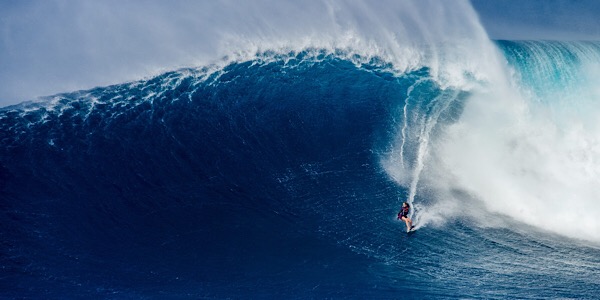
Definitely! It sounds like you had a great group. What did you know prior about Bethany Hamilton?
Aaron Lieber: Well, I had been making surf films for ten years prior to this, and I’ve worked with all of the best male and female surfers. So, through that process I had gone on a few trips with Bethany and became friends with her and her brother Noah. I knew her story, I knew Soul Surfer, but I was never really interested in the fact that she lost her arm. Of course, she’s courageous, but what got me really excited was how good she was at surfing. I was on a trip with three-time world champ Carissa Moore and Bethany was just as good.
And on another trip with Lakey Peterson, whose number one in the world right now, she was -again- surfing just as good! I was like “wow, that’s exciting!” That was motivation for everything, to show her prowess on a wave, and I just don’t think there is enough female narratives out there, especially in the sport’s realm, so I wanted to shine a light on that. And sure, we also touch on the shark attack, and her overcoming all of these things. But at the end of the day it’s her skill set on a wave and finding her voice. That was the fun part.
I think you did a terrific job with that, it’s really evident in the film.
Aaron Lieber: Cool!
You kind of answered my next question already, but what was your goal in doing this? I know you wanted to showcase Bethany’s talent surfing, but how else would you summarize your intent with the documentary?
Aaron Lieber: From a more general standpoint, Bethany speaks to a million people on an inspirational level. So, how do you create a story that has a message, but doesn’t tell anyone what to do? She has very strong beliefs, in her faith, and we try to tell it in a way that brings people in. A way that allows them to see her for who she is, and also makes them more interested to find out more. We want to make it more inclusionary. There are also some gender swapping roles with her husband, because her husband is a stay at home dad. There are a lot of things that aren’t typical, and I think that’s really fun and it’s true to their life. It’s not political, but in the space we currently live in, it has some messages that are different than a lot of other films out there.
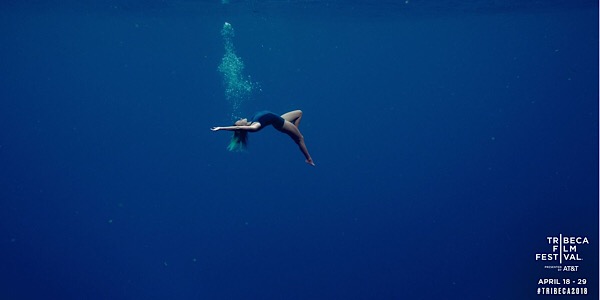
Were there any surprises or anything that you found out that you were most excited about?
Penny Edmiston: Obviously, the skill set that she has is amazing. I went into it thinking I already knew her story, but I didn’t. I only knew the one little piece that’s been put out into the world. The fact that she got pregnant during the film-making was an unbelievable surprise because the film is really authentic. They had built such an amazing relationship [Bethany and Aaron] that they were able to just keep going through that. She could have just as easily been like “this is a film only about my surfing ability” but she didn’t. The audience gets a full, authentic person, going through being a mother. And what is she going to do about the surfing? You get all of that, her questioning about what’s going to happen.
That comes across as well.
Aaron Lieber: The other amazing thing about Bethany is her willingness to be vulnerable. In the culture we live in, vulnerability can be considered a weakness, but for her it’s a strength. I think that’s a really important message because we all face challenges and go through different things. The film is called Unstoppable because I think she is unstoppable. She doesn’t necessarily agree with me, [laughs] because when facing challenges, you don’t always feel that way. With her story, and her message, can hopefully translate to other people that they too can also be unstoppable if they choose to be.
Amazing, well put! I’m sure many people will have that response. And what’s next for you?
Aaron Lieber: Oh, I’m planning to sleep for a while! [laughs]
We want to thank Penny Edmiston, Jane Kelly Kosek, and Aaron Lieber for taking the time out of their busy Tribeca schedule to sit down with us.
Does content like this matter to you?
Become a Member and support film journalism. Unlock access to all of Film Inquiry`s great articles. Join a community of like-minded readers who are passionate about cinema - get access to our private members Network, give back to independent filmmakers, and more.
Kristy Strouse is the Owner/Editor in Chief of Film Inquiry, writer, podcaster, and all around film and TV fanatic. She's also VP of Genomic Operations at Katch Data and is a member of The Online Association of Female Film Critics and The Hollywood Creative Alliance. She also has a horror website: Wonderfully Weird & Horrifying.













